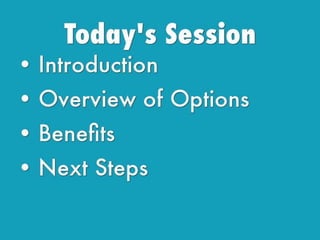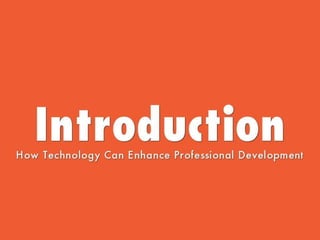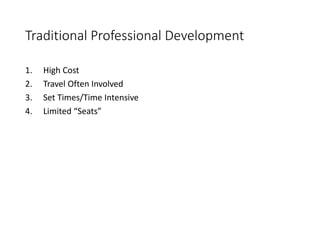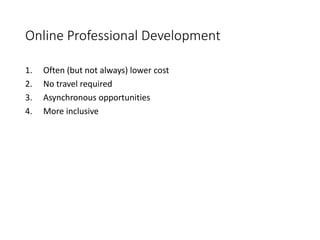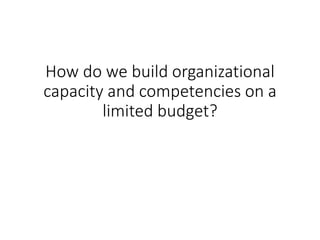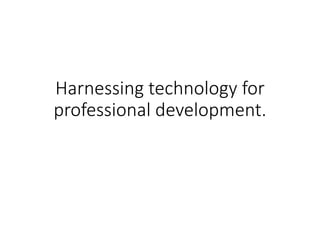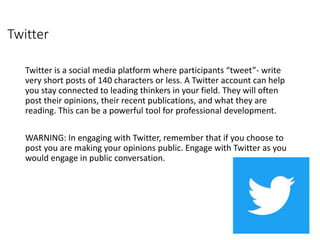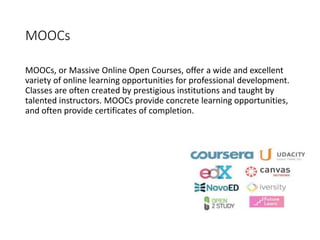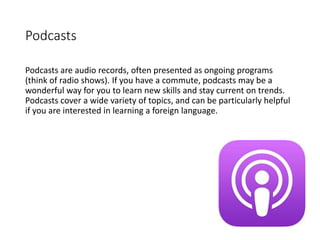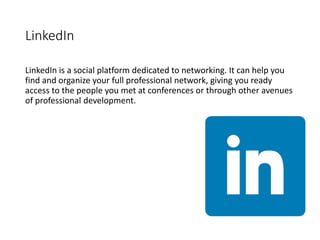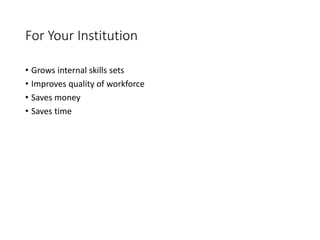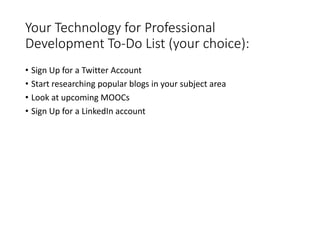Tech Yourself - Using Technology for Professional Development
- 1. Photo by pedrosimoes7 - Creative Commons Attribution License https://www.flickr.com/photos/46944516@N00 Created with Haiku Deck
- 4. Traditional Professional Development 1. High Cost 2. Travel Often Involved 3. Set Times/Time Intensive 4. Limited ŌĆ£SeatsŌĆØ
- 5. Online Professional Development 1. Often (but not always) lower cost 2. No travel required 3. Asynchronous opportunities 4. More inclusive
- 6. How do we build organizational capacity and competencies on a limited budget?
- 7. Harnessing technology for professional development.
- 9. Twitter Twitter is a social media platform where participants ŌĆ£tweetŌĆØ- write very short posts of 140 characters or less. A Twitter account can help you stay connected to leading thinkers in your field. They will often post their opinions, their recent publications, and what they are reading. This can be a powerful tool for professional development. WARNING: In engaging with Twitter, remember that if you choose to post you are making your opinions public. Engage with Twitter as you would engage in public conversation.
- 10. MOOCs MOOCs, or Massive Online Open Courses, offer a wide and excellent variety of online learning opportunities for professional development. Classes are often created by prestigious institutions and taught by talented instructors. MOOCs provide concrete learning opportunities, and often provide certificates of completion.
- 11. Blogs Following blogs, typically informal web-published content, can be a great way to find out whatŌĆÖs trending in your professional area. If you start a blog of your own, you can also create a positive search result for people looking to find out more about your work. Blog platforms like Wordpress, Blogger, and Tumblr provide attractive prebuilt blog set-ups.
- 12. RSS Feeds RSS Feeds are links to the blogs you are interested in. By collecting the feeds/URLs in a tool like Feedly, Pocket, or DiggReader, you can find all the blog content youŌĆÖre interested in at one URL.
- 13. Podcasts Podcasts are audio records, often presented as ongoing programs (think of radio shows). If you have a commute, podcasts may be a wonderful way for you to learn new skills and stay current on trends. Podcasts cover a wide variety of topics, and can be particularly helpful if you are interested in learning a foreign language.
- 14. LinkedIn LinkedIn is a social platform dedicated to networking. It can help you find and organize your full professional network, giving you ready access to the people you met at conferences or through other avenues of professional development.
- 16. For You ŌĆó Opportunity to engage with and network with a larger professional community ŌĆó Improving your employability, adding to your resume ŌĆó Making the case for raises and promotions ŌĆó Keeping up on developments in your area of expertise ŌĆó Saves money ŌĆó Saves time
- 17. For Your Institution ŌĆó Grows internal skills sets ŌĆó Improves quality of workforce ŌĆó Saves money ŌĆó Saves time
- 19. Your Technology for Professional Development To-Do List (your choice): ŌĆó Sign Up for a Twitter Account ŌĆó Start researching popular blogs in your subject area ŌĆó Look at upcoming MOOCs ŌĆó Sign Up for a LinkedIn account


